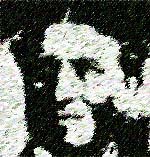
Matthew Arnold, Culture is "High Culture"
From Culture and Anarchy, 1869
 Matthew Arnold (1822-1888) was a preeminent poet of the Victorian era, a lifelong educator, a pioneer in the field of literary criticism, a government official (Inspector of Schools), and an influential public figure. But one of his most enduring legacies is his extensive body of writing on the topic of culture. Arnold saw culture--"contact with the best which has been thought and said in the world" (cf. "high culture" in the glossary) --as the crucial component of a healthy democratic state. Matthew Arnold (1822-1888) was a preeminent poet of the Victorian era, a lifelong educator, a pioneer in the field of literary criticism, a government official (Inspector of Schools), and an influential public figure. But one of his most enduring legacies is his extensive body of writing on the topic of culture. Arnold saw culture--"contact with the best which has been thought and said in the world" (cf. "high culture" in the glossary) --as the crucial component of a healthy democratic state.
Arnold's view of culture as involving such characteristics as "beauty," "intelligence," and "perfection" is a Neoplatonic one -- that is, it tends to assume that these values exist in the abstract and are the same for all human societies. His argument, then, is openly political: he feels that if more people will share and pursue his notions of beauty, truth, and perfection--of culture--that the world will be a better place.
Compare this view with that of Raymond Williams -- who argues that culture isn't just the "best that has been thought and said," but rather that "culture is ordinary" -- and with the anthropological perspectives of John Bodley and Clifford Geertz, which attempt to view culture more descriptively and to approach the study of human societies with an assumption that values, behaviors, and ideologies are different from people to people. Taken together, this group of excerpts illustrates the general move away from the Arnoldian conception of culture. |

The disparagers of culture make its motive curiosity; sometimes, indeed, they make its motive mere exclusiveness and vanity. The culture which is supposed to plume itself on a smattering of Greek and Latin is a culture which is begotten by nothing so intellectual as curiosity; it is valued either out of sheer vanity and ignorance or else as an engine of social and class distinction, separating its holder, like a badge or title, from other people who have not got it. No serious man would consider all this culture, or attach any value to it, as culture, at all.
But there is of culture another view, in which not solely the scientific passion, the sheer desire to see things as they are, natural and proper in an intelligent being, appears as the ground of it. There is a view in which all the love of our neighbour, the impulses towards action, help, and beneficence, the desire for removing human error, clearing human confusion, and diminishing human misery, the noble aspiration to leave the world better and happier than we found it, come in as part of the grounds of culture, and the main and pre-eminent part. Culture is then properly described not as having its origin in curiosity, but as having its origin in the love of perfection; it is a study of perfection. It moves by the force, not merely or primarily of the scientific passion for pure knowledge, but also of the moral and social passion for doing good. As in the first view of it [ie. the view associated with science/curiosity], we took for its worthy motto Montesquieu's words: "To render an intelligent being yet more intelligent!" so, in the second view of it [ie. Arnold's view], there is no better motto which it can have than these words of Bishop Wilson: "To make reason and the will of God prevail!"
The moment culture is considered not merely as the endeavour to see and learn about the universal order, but as the endeavor, also, to make it prevail, the moral, social, and beneficent character of culture becomes manifest.
***
The Greek idea of "a finely tempered nature" gives exactly the notion of perfection as culture brings us to conceive it: a harmonious perfection, a perfection in which the characters of beauty and intelligence are both present, which unites "the two noblest of things,"--as
Swift, who of one of the two, at any rate, had himself all too little, most happily calls them in his Battle of the Books,--"the two noblest of things, sweetness and light." The man with a finely tempered nature is the man who tends toward sweetness and light.

 go back to What Is Culture? page
go back to What Is Culture? page
 Matthew Arnold (1822-1888) was a preeminent poet of the Victorian era, a lifelong educator, a pioneer in the field of literary criticism, a government official (Inspector of Schools), and an influential public figure. But one of his most enduring legacies is his extensive body of writing on the topic of culture. Arnold saw culture--"contact with the best which has been thought and said in the world" (cf. "high culture" in the glossary) --as the crucial component of a healthy democratic state.
Matthew Arnold (1822-1888) was a preeminent poet of the Victorian era, a lifelong educator, a pioneer in the field of literary criticism, a government official (Inspector of Schools), and an influential public figure. But one of his most enduring legacies is his extensive body of writing on the topic of culture. Arnold saw culture--"contact with the best which has been thought and said in the world" (cf. "high culture" in the glossary) --as the crucial component of a healthy democratic state. 


 go back to What Is Culture? page
go back to What Is Culture? page